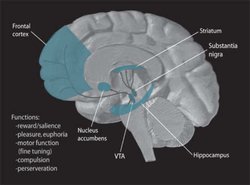Most attempts to stop smoking fail because of physiological of psychological cravings. Therefore, you can be prepared to cope with cravings when you quit smoking by relying on three proven strategies: The ABCD-Technique for acute cravings, causal strategies for long-term cravings and a strong motivational profile of stop smoking benefits.

How to Cope With Cravings When You Stop Smoking
by godbersen
This article describes how you can cope with short-term and long-term cravings when you quit smoking.
The ABCD-Technique for Acute Cravings
Especially during the first days after you have quit smoking you will face cravings such as headaches, attacks of sweating or difficulties to concentrate. These short-term cravings normally disappear after a few days. Nonetheless, you need to be prepared to successfully cope with these difficult situations. Serving this purpose the ABCD-Technique can be a strong solution:
- Abide the cravings (they will normally disappear after a few minutes)
- Breath deeply a few times
- Cold water to be drunk consciously
- Distract your mind to something else
Stop Smoking Strategies for a Causal Solution
You can also face long-term cravings, even months after you have quit smoking. Common symptoms are restlessness, depression or aggression. Normally, these cravings last longer so that the ABCD-Technique is not sufficient.
The sole approach that can sustainably help you is a causal stop smoking strategy. The causal coping with cravings aims to break and change smoking habits. Analyse all of the situations you used to smoke and develop solutions how you can cope with the referring difficulties. If you conduct a detailed analysis and design an effective therapy plan you can rely on your stop smoking strategies during the active phase of dehabituation as well as later in your smoke-free life.
Stop Smoking Video Series 4/6: Stop Smoking Strategies
Stop Smoking Benefits as a Strong Motivation
As shown, it is not easy to stop smoking and stay smoke-free. To successfully face this challenge and cope with the very likely cravings a strong motivation can significantly help you. The fundamental drive to stop smoking must come from you and you are solely responsible if you succeed or not.
However, you can develop a strong motivational profile which can guide you through difficult times during your active dehabituation in three steps: Firstly, collect all benefits that a smoke-free life provides. Then, choose the reasons which are important to you. And thirdly, specify these benefits for your personality and individual situation.
When you face cravings you can visualise your personal reasons as to why you quit smoking so that you have a strong motivation to withstand cravings and deal successfully with difficulties.
What to Learn from Dealing With Cravings
To overcome the short-term and long-term cravings can be one of the most important experiences of your way to a smoke-free life. Surely you do not want to face such unpleasant situations again. Furthermore, you will realise that you have accomplished a very difficult mission. From this experience you should learn that you should never make an exception from your smoke-free life and risk to relapse.
You might also like
How To Turn Off The TV And Start LivingMost of us have favorite programs we enjoy watching. But it is all too easy...
Alcohol & Addiction Intervention for a drug free America, Dopa...Substance use and misuse, dopamine levels & brain chemicals, Anti drug ads & ...



 Stop Smoking with the Cognitive and Behavioral Therapyon 05/20/2013
Stop Smoking with the Cognitive and Behavioral Therapyon 05/20/2013
 What to Do When We Lose Our Freedom: The Principle of Reactance:on 05/20/2013
What to Do When We Lose Our Freedom: The Principle of Reactance:on 05/20/2013
 Fundamentals of Financial Analysis and Planning for Private Householdson 04/10/2013
Fundamentals of Financial Analysis and Planning for Private Householdson 04/10/2013
 The Seven Aspects of Assertive Communicationon 04/03/2013
The Seven Aspects of Assertive Communicationon 04/03/2013


Comments